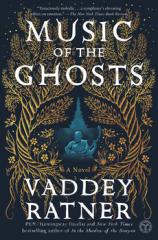Reading Group Guide
Discussion Questions
Music of the Ghosts

1. Teera feels sure that Amara has had to live with a “divided self” since fleeing her homeland and coming to live in Minnesota. In what ways does Teera, herself, live with an incomplete sense of her identity?
2. When she first visits Wat Nagara, Teera panics, feeling sorrowful and isolated. “She wanted to be alone with the ghosts, to seek communion with her loved ones. Instead she came face to face with her aloneness, saw it reflected wholly, indelibly, in the engraved invocation.” Compare these two kinds of solitude. Why is one so much more painful for her than the other?
3. Among the many parallels between the musicians’ lives, both Sokhon and Tun abandon their young daughters on the eve of war. Review each father’s reasons for doing so. Is this abandonment more cruel or more kind?
4. Compare the ways in which the novel’s three main female characters, Channara, Amara and Suteera, deal with the trauma of the Cambodian genocide. What are the “breaking points” for their grief? Would you characterize some of the women as stronger than others?
5. How does Mr. Chum become a father figure for Teera during her visit to Cambodia? Describe the many ways the novel invokes the meaning of family, disrupted and recreated.
6. “The hues of one love simmer in another.” There are many layered relationships in the novel, in which certain figures become stand-ins or foils for another. Choose a few pairings to discuss. Some ideas include: Channara/Teera, Sokhon/Tun, Teera/Sita, Teera/Lah and Narunn/The Old Musician.
7. Several times in the novel, Teera’s first encounters are infused with questions from the past, as in her descriptions of meeting the Old Musician and Dr. Narunn. How does the author’s writing convey this interplay of perception, hope and memory? What does it reveal about the characters?
8. Much of the novel explores how we adapt to and survive in the face of inhumanity. Still, it doesn’t sugarcoat the lasting effects of fear, desperation, and ruthlessness on its characters’ psyches. Would you say that MUSIC OF THE GHOSTS has an optimistic message?
9. “Foreigners have often said ours is a ‘culture of impunity.’ An English phrase, as you know.... What does it really mean?” Discuss the abbot’s question. Judging by Ratner’s description in the book, would you describe the Cambodian culture as such?
10. One of MUSIC OF THE GHOSTS’ most resonant themes is that of justice: what it entails, and what its limits are. What is your definition of justice? Is there a difference between justice and retribution, as the Old Musician suggests?
11. Consider the modern children in the book: the young monks, Lah, and Makara, the young addict-turned-novice. How are they affected by the legacy of the war and genocide?
12. The Old Musician feels responsible for Sokhon’s fate, and a single question has tormented him for decades. Was he right to do what he did in Slak Daek? What would you have done in the same situation? The question is a good one for debate.
Music of the Ghosts
- Publication Date: April 3, 2018
- Genres: Fiction
- Paperback: 352 pages
- Publisher: Touchstone
- ISBN-10: 1476795797
- ISBN-13: 9781476795799








